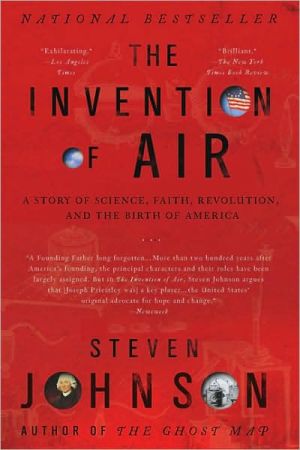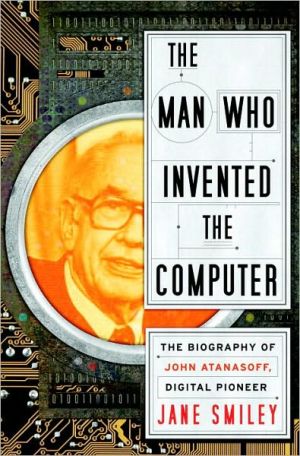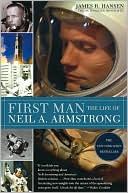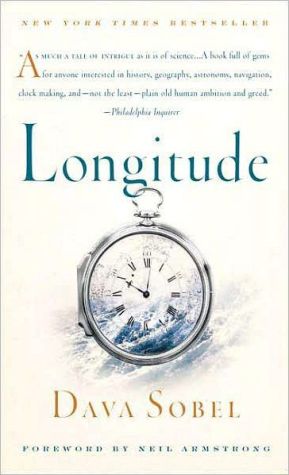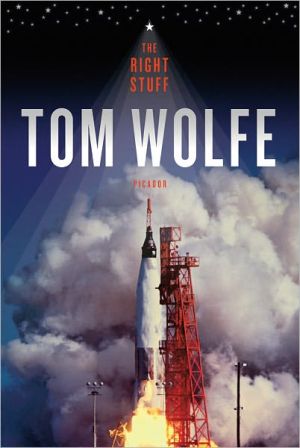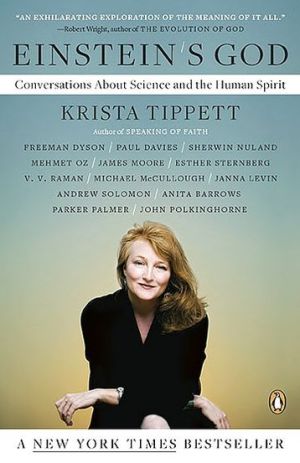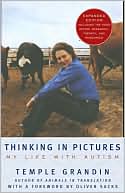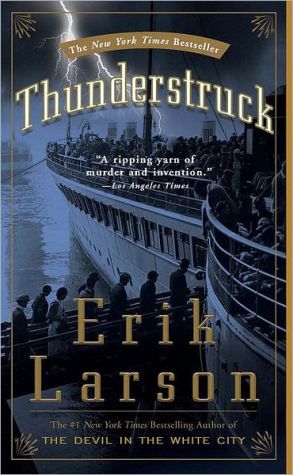Invention of Air: A Story of Science, Faith, Revolution, and the Birth of America
"The Invention of Air is a book of world-changing ideas wrapped around a compelling narrative, a story of genius and violence and friendship in the midst of sweeping historical change that provokes us to recast our understanding of the Founding Fathers." "It is the story of Joseph Priestley - scientist and theologian, protege of Benjamin Franklin, friend of Thomas Jefferson - an eighteenth-century radical thinker who played pivotal roles in the invention of ecosystem science, the discovery of...
Search in google:
Bestselling author Steven Johnson recounts in dazzling, multidisciplinary fashion the story of the brilliant man who embodied the relationship between science, religion, and politics for America s Founding Fathers.The Invention of Air is a book of world-changing ideas wrapped around a compelling narrative, a story of genius and violence and friendship in the midst of sweeping historical change that provokes us to recast our understanding of the Founding Fathers.It is the story of Joseph Priestley scientist and theologian, protégé of Benjamin Franklin, friend of Thomas Jefferson an eighteenth-century radical thinker who played pivotal roles in the invention of ecosystem science, the discovery of oxygen, the founding of the Unitarian Church, and the intellectual development of the United States. And it is a story that only Steven Johnson, acclaimed juggler of disciplines and provocative ideas, can do justice to.In the 1780s, Priestley had established himself in his native... The Barnes & Noble Review Thomas Carlyle's dictum that "the history of the world is but the biography of great men" would be more serviceable, though less aphoristic, if adjusted to: "history is sometimes best recounted through the biographies of great people." The lives of Benjamin Franklin and Joseph Priestley are perfect cases in point; to describe them is to describe the tumultuous and world-changing second half of the 18th century. This is not just because of the role these men played -- Franklin more directly than Priestley -- in the American and French revolutions and their aftermath, but because of their involvement in the scientific and intellectual advances of the time, Priestley more directly than Franklin. Because both the politics and the science to which they contributed were elements in the larger story of the Enlightenment, the lives of these men are especially interesting and iconic.
A Story of Science, Faith, Revolution, and The Birth of America Author's Note\ Prologue. The Vortex\ Chapter One. The Electricians\ Chapter Two. Rose and Nightshade\ Chapter Three. Intermezzo: An Island of Coal\ Chapter Four. The Wild Gas\ Chapter Five. A Comet in the System\ Acknowledgments Notes Bibliography Index
\ From Barnes & NobleA Selection of Barnes & Noble Recommends\ This exciting saga about a brilliant 18th-century iconoclast matches a talented storyteller with a superb subject.\ \ Internationally famous in his own time, British polymath Joseph Priestley (1733-1804) is best remembered today, if at all, as the discoverer of oxygen, sulfur dioxide, nitrous oxide, and other "different kinds of airs." Few of us know that this eminent scientist was also a prominent participant in the early shaping of the American Republic. Steven Johnson's riveting The Invention of Air renders that story with all its implicit drama, tracking this protean thinker through an active life punctuated by controversy. In England, Priestley's radical religious views and support of the French Revolution made him the target of violent riots; when he and his family emigrated to the United States in 1794, his ideas and writings became political lightning rods, influencing many thinkers, most significantly Thomas Jefferson. This carefully researched narrative by the author of The Ghost Map provides a revealing view of a history we thought we knew.\ \ \ \ \ Russell ShortoJohnson's new book, The Invention of Air, shows its genre-mixing in its subtitle; it uses Priestley as the fulcrum for a story that blends "science, faith, revolution and the birth of America." What enlivens the book is that Johnson does not simply describe the system within which Priestley and his contemporaries hashed out the features of classical science; he sets it against other, later systems for comprehending physical reality, showing laymen how far we have come from the classical age of science.\ —The New York Times\ \ \ Publishers WeeklySignatureReviewed bySimon WinchesterThis is an intelligent retelling of a rather well-known story, that of Joseph Priestley, the Yorkshire dissenting theologian and chemist, and then went on to emigrate to America and advised the creators of the new republic-Thomas Jefferson, most notably-on how best to run their country.Steven Johnson, who has a fine reputation for discerning trends and for his iconoclastic appreciation of popular culture, chooses his topics well. His most recent book, The Ghost Map, looked at the story-also very familiar-of the London cholera epidemic of 1854, and of the heroic epidemiologist, John Snow, who discovered the ailment's origins and path of transmission. It was a good story, but essentially a simple one.With Priestley, Johnson has now taken on a subject that is every bit as complex and multifaceted as any of the Quentin Tarantino films he so admires. Priestley was a scientist, true, and his meditations on the exhalations of gases from mint leaves and the curiosities of phlogiston and "fixed air," his discoveries of sulfur dioxide, nitrous oxide, ammonia gas-and oxygen, most importantly-and his relationship with his French rival Lavoisier have been the stuff of schoolroom chemistry lessons for more than two centuries. But it is his politically liberal and spiritually dissenting views that underpin the story that Johnson chooses to tell-views that led in 1794 to Priestley, whose house in Birmingham had been sacked by rioters, emigrating to America, thereby becoming "the first great scientist-exile, seeking safe harbour in America after being persecuted for his religious and politicalbeliefs at home. Albert Einstein, Otto Frisch, Edward Teller, Xiao Qiang-they would all follow in Priestley's footsteps."Johnson unearths an interesting and illuminating statistic: in the 165 letters that passed between Thomas Jefferson and John Adams, the name Benjamin Franklin is mentioned five times, George Washington three times, Alexander Hamilton twice-and Joseph Priestley, a foreign immigrant, is cited no fewer than 52 times. The influence of the man-he was a fervent supporter of the French Revolution, a tolerant stoic and a rationalist utterly opposed to religious fundamentalism-was quite astonishing, and Steven Johnson makes a brave and generally successful attempt to summarize and parse the degree to which this influence infected the founding principles of the American nation. As a reminder of the underlying sanity and common sense of this country-a reminder perhaps much needed after the excesses of a displeasing presidential election campaign-The Invention of Air succeeds like a shot of the purest oxygen. Illus. (Jan. 2)Simon Winchester, author ofThe Professor and the Madman, is working on a biography of the Atlantic Ocean.Copyright © Reed Business Information, a division of Reed Elsevier Inc. All rights reserved.\ \ \ \ \ Library JournalJoseph Priestley (1733-1804) was a veritable Renaissance man, whose interests and skills ranged from science to religion to politics. Science writer Johnson (The Ghost Map) weaves together all of these themes and how they played out in his life, in early America, and among the Founding Fathers. He tells the story in a reader-friendly manner that also encourages readers to think about how these themes apply in today's world. This work covers different ground from Jerome D. Bowers's 2007 Joseph Priestley and English Unitarianism in America and discusses more of the culture of the times than the more costly but thorough 2008 collection of essays edited by Isabel Rivers, Joseph Priestley, Scientist, Philosopher, and Theologian. Recommended for all large public and all academic libraries.\ —Eric D. Albright\ \ \ \ \ \ The Barnes & Noble ReviewThomas Carlyle's dictum that "the history of the world is but the biography of great men" would be more serviceable, though less aphoristic, if adjusted to: "history is sometimes best recounted through the biographies of great people." The lives of Benjamin Franklin and Joseph Priestley are perfect cases in point; to describe them is to describe the tumultuous and world-changing second half of the 18th century. This is not just because of the role these men played -- Franklin more directly than Priestley -- in the American and French revolutions and their aftermath, but because of their involvement in the scientific and intellectual advances of the time, Priestley more directly than Franklin. Because both the politics and the science to which they contributed were elements in the larger story of the Enlightenment, the lives of these men are especially interesting and iconic. \ Though Franklin has a significant role in this book, Steven Johnson focuses chiefly on Priestley to draw together the threads of science, politics, religion, and the history and leading personalities of that revolutionary age. He does not offer a biography of Priestley but a sketch of his adult working life and achievements. The book's somewhat hyperbolic title alludes to Priestley's discoveries in the chemistry of gases; its even more hyperbolic subtitle alludes to Priestley's theological innovations, his career as a political pamphleteer, and his friendships with Franklin and -- later, when he had been driven into exile in America -- Thomas Jefferson.\ Without doubt, Priestley's story is an excellent hook from which to hang the tale of discovery and upheaval that marks the birth of the modern world. Priestley made important discoveries in chemistry, arguably laying the foundations of that science, and in addition made major contributions to contemporary debate in ethics, theology, and politics. His attack on the "corruptions" of Christianity, prompted by his Unitarian outlook and his view of Jesus as a mortal teacher of ethics, together with his support for the revolutionary causes in America and France, put him beyond the pale of conventional "Establishment" opinion in England but earned him extraordinary admiration from other quarters, Jefferson not least among them; indeed Jefferson described Priestley as "one of the few precious lives to mankind."\ Priestley was, in short, a polymath of genius. By the time he left school he knew Greek, Latin, Hebrew, Arabic, French, Italian, German, and the rudiments of geometry and algebra, all but the first two self-taught. At the Dissenting academy in Daventry (none but members of the Church of England could attend Oxford and Cambridge) he learned the basics of science as it then existed, and a lifelong passion for experimental work was born. At first he made a living as a teacher and Dissenting preacher, though his increasingly Unitarian views limited his career in the latter respect. His reputation was soon secured by the success of his researches on electricity and then on air, the first earning him a fellowship of the Royal Society and the second its prestigious Copley Medal.\ A remarkable feature of Priestley's work was its fertility in practical applications. For example: he had to teach himself to draw in order to illustrate his book on electricity, and in the painstaking process of doing so found that India rubber was an excellent remover of lead pencil marks. He commented on the discovery in the book's preface, and the eraser was born. His work on "fixed air" (carbon dioxide) led to the invention of carbonated water, and soda became a commercial success in his own day. His discovery that plants "dephlogisticate" air was the source of much important chemistry in the work of Priestley's contemporary Lavoisier (who coined the name "oxygen") and eventually, two centuries later, led to the concept of the "ecosystem," recognizing the interdependence of all levels of animal and vegetable life.\ Johnson gives an account of Priestley's scientific work and to a much lesser extent his political and theological writings, adding a commentary on the nature of the growth of ideas and scientific progress as he does so. This part of the book is, alas, repetitive and much padded, and it sometimes reads like a fifth grade textbook. Priestley's work on electricity and gas is explained in terms too simple to convey either the ingenuity of the experiments performed or their full significance as revealed by later science. Johnson is intrigued by the debates Thomas Kuhn and others have conducted into the way scientific paradigms change, a pertinent matter given that Priestley and his contemporaries were very much engaged in changing scientific paradigms; but this is overdone at the expense of the more interesting story, which is how Priestley's scientific discoveries were made and what they meant.\ The book gets much better in the later chapters, where Johnson describes the hostility Priestley attracted because of his views on the French Revolution. Priestley's house in Birmingham was burned down by a mob, and he soon afterward went into exile in America, there to become friends with Jefferson and to fall out with John Adams; in the famous correspondence between these two presidents -- the correspondence that began long after their respective presidencies were over -- Priestly figured centrally, because of a letter Jefferson had sent him immediately on becoming president.\ Priestley had nearly been deported under the terms of the highly illiberal Alien and Sedition Acts, which Adams's administration passed and which Jefferson, though Adams's vice president at the time, later called "a libel on legislation." In a way that prefigured General De Gaulle's refusal to imprison Jean-Paul Sartre ("one does not imprison Voltaire"), Adams refused to have Priestley deported, and when he learned of Jefferson's critical description of the Acts he wrote to remonstrate, initiating the most stirring phase of the Jefferson-Adams correspondence. All this is well told by Johnson and brings to a fit conclusion the story of Priestley's remarkable life close to the center of the great affairs of his time.\ One thing this short and mainly insubstantial book shows is that a really good biography of Joseph Priestley is long overdue; the last dates to 1931, and given the wealth of incident, importance, science, politics, theology, and great events and individuals involved, the hand of a master is urgently needed to remedy the lack. --A. C. Grayling\ A. C. Grayling is an author, playwright, reviewer, cultural journalist, and professor of philosophy at London University. The most recent of his many books are Towards the Light of Liberty and The Choice of Hercules. His play Grace was recently performed in New York City.\ \ \
